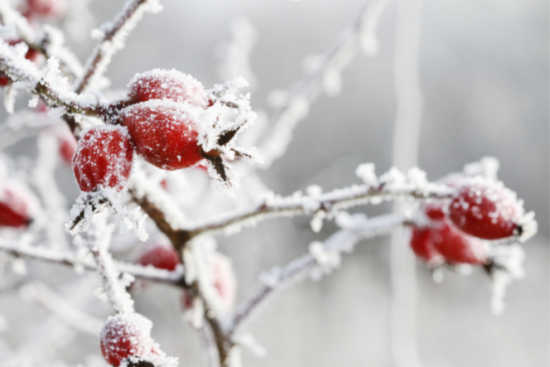Rosehips are a great natural medicine to forage for during fall and begin to appear in early autumn and throughout the winter months after they have set blooms.
To find rosehips, you need to be able to identify wild roses. Wild roses typically grow in fields, disturbed areas, or thickets as well as along woodland edges, roadsides, and trails. If you have wild roses, please remember that rose hips will only form where the flower was, so don’t cut all of the flowers if you want to harvest the hips for medicinal use! We have some wild snowberries, and while the flowers are similar, they produce a white berry that is toxic to humans, so please know the difference before harvesting!
Because the flowers appear so similar, you need to look at the color of the rose hips or berries. If your plant produces white berries in the winter, you have a snowberry plant. That isn’t a bad thing, just an article for another day. If your plant produces the rose hips, you have a wild rose bush. A wild rose bush (sometimes called a prickly rose) will not produce berries.
Benefits of Rosehips
Rose hips are a rich source of Vitamin C, with about 1700-2000 mg per 100 g in a dried product, They can be used as a remedy for rheumatoid arthritis; reduce the symptoms of knee and hip osteoarthritis; help the immune system to fight off foreign invaders and out of control cells; facilitates fat metabolism; protect tissues from free radical damage; assist the nervous system by converting certain amino acids into neurotransmitters; prevent scurvy by offering vitamin C, protects adrenal function; ability to prevent urinary bladder infections, and assist in treating dizziness and headaches. Rosehips have been used externally in an oil form to restore firmness to the skin by nourishing and astringing the tissue. When brewed into a decoction, can also be used to treat constipation. Because rose hips contain lots of iron, rosehip tea is used during menstruation to make up for the iron loss.
All rose hips from any type of rose, even cultivated varieties, are edible and have medicinal use!
How To Harvest Rosehips
Make sure you are harvesting rose hips, and not snowberries. Do not harvest white berries! Rosehips look like the following:

All roses have curved thorns and alternate, pinnate leaves with 3-9 leaflets; the flowers are symmetrical and are typically pink or white. Some species of wild rose, such as multiflora rose (Rosa multiflora) and dog rose (Rosa canina) are climbing vines. Other varieties, such as Virginia rose (Rosa virginiana) or rugosa rose (Rosa rugosa) is more shrub-like in appearance.
Identifying Rosehips
Rosehips are easy to identify! They are red to orange in color, oblong or round in shape, often with small wisps of “hair” protruding from the bottom of the rosehip.
How To Harvest Rosehips
Begin harvesting rose hips in the fall. The longer the rose hips grow on the plant the sweeter they become. It’s ok if they are a bit wrinkly too! Always look for red to orange (no green) rose hips that easily detach from the stem, you shouldn’t have to tug much to harvest them. Rose hips become sweeter and more flavorful if they’re exposed to frost before being harvested, so often waiting until late autumn is best.
Helpful Tips After You Have Harvested Rosehips
Rose hips have threadlike hairs inside and around the seeds that can be irritating to the throat and stomach if ingested. Before serving anything made with rose hips make sure to pass it through a coffee filter, several layers of cheesecloth, or another equally fine material. If you will be consuming whole rose hips in something that cannot be strained, such as in cookies or jam, be sure to cut them open and scoop out the seeds and irritating hairs before using them. This is easiest with larger rose hips.
If you cannot forage for rosehips or are unsuccessful at finding them, some herbal and natural medicine outlets will sell you some rosehips! You can always buy dried rose petals or dried rosehips from Mountain Rose Herbs, This is a great place to buy high-quality, organic herbs).
This article was originally published at Ready Nutrition™ on October 27th, 2021







